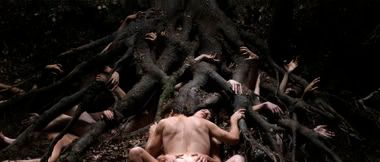

Lars von Trier's "Antichrist" has polarized critics and was the controversy of the 2009 Cannes Film Festival, and for fine reason. This is a rare, disturbing, and horrific exploration into von Trier's personal outlook on grief, pain, and despair (chapters of which the film is divided into), and it is at first fascinating but then makes a sharp and crippling turn to infuriating. Von Trier (most known for his "Dogville") notes that filming this creation helped him overcome his period of depression. All right, so we know what this film did for the director, but what does it do for us? Here's a film so frightfully self-indulgent that the artist might as well have kept his vision inside his own head.
It starts with a woman coping with the death of her child. A nameless couple (Willem Dafoe and Charlotte Gainsbourg) are in the throes of intimacy when, unbeknownst to them, their young son, a toddler, gets out of his crib, makes his way toward an open window, and goes tumbling out of it along with his teddy bear. The woman's grief is unbearable, and the performance by Charlotte Gainsbourg, which won her the Best Actress prize at Cannes, is one of startling anguish and emotional potency. Her acting is both literally and figuratively naked and also equal parts psychological and physical. Gainsbourg's bravery toward the role is one worth admiring. That is until von Trier sends her character directly into unexplained insanity, much like the rest of the film.
The man, Dafoe in a performance much more subdued and less convincing than his counterpart's, acts as a therapist to his wife attempting to find the source to what she most fears. They both journey to an isolated cottage in the woods called Eden, which is shot by Anthony Dod Mantle ("Slumdog Millionaire") in a beautiful, pulsating, digital style that includes some strange optical effects. The location of Eden drips with metaphor and allegory full of raining acorns, animal fetuses, and a talking fox that looks the man square in the eyes and says, "Chaos reigns." The woman calls nature "Satan's church," and she had been doing research in the attic about old pagan rituals involving women. What does it all mean? Von Trier's meanings aren't ambiguous, they're incomprehensible. It's not that it's over our heads, it just isn't there. It's muddled, and it thematically falls apart. And in the end, it's an examination that gets too close for comfort, and the real shock becomes the sad fact that the only thing von Trier brings to the table is shock value. At one point the film becomes a slasher flick. Allow me to explain:
The latter half of "Antichrist" deteriorates into graphic violence, which includes vivid scenes and close-ups of self-inflicted genital mutilation. This film could've been an intense and dark meditation on some deep ideals, but the fact that it almost, kind of, begins to encroach upon this intrigue is not excuse enough for an ending so absolutely grisly and unwatchable. It's hard to tell where von Trier's mind is on death, birth, infertility, and the intrinsic nature of women. Are they evil? Is the film painfully misogynistic or subtly feminist? In the end, it doesn't even matter.





No comments:
Post a Comment